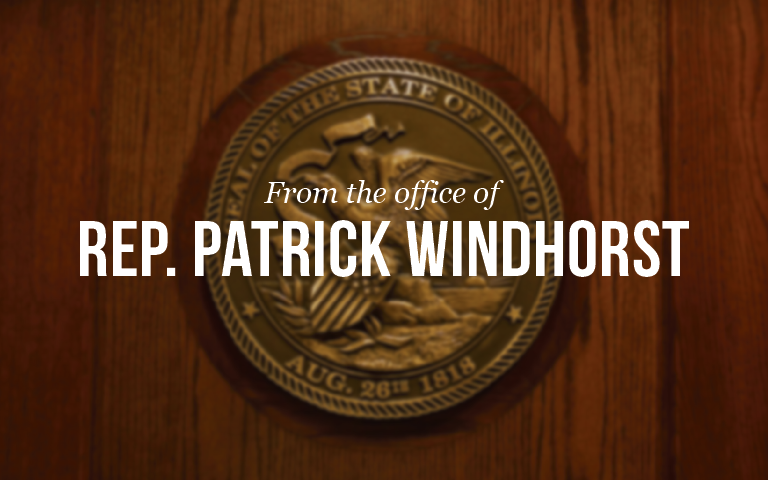Last month, the General Assembly returned to session for the first time since early March for an abbreviated special session designed to take up a few items related to the budget and the state government’s response to COVID-19. While the end of May is typically a busy time for the legislature, this year the end of session was compressed into three scheduled days, which spilled into a fourth.
COVID-19 caused a shortened legislative schedule, but that is not the only change the General Assembly experienced because of the virus. The House of Representatives met not at the Capitol, but on the floor of the Bank of Springfield Civic Center, which is a 7,000 seat arena that with the exception of legislators, staff, law enforcement, and a few media members, remained mostly vacant during the week. The tables were set up six feet apart, and after an initial rules vote, legislators were required to wear face coverings to participate in the session.
Once we got down to the business of legislating, the most important item that we took up was the state budget. The budget called for nearly $43 billion in spending for fiscal year 2021, which represents a $2 billion increase of fiscal year 2020. Because of the government lockdown, which began in March, and the estimates of reduced tax revenues throughout this year, the budget had a projected deficit of over $6 billion. That deficit was made up in large part by borrowing of $5 billion from the federal government.
I voted against the budget because it operates at a deficit, which will add to the state’s unpaid bills, it requires more borrowing, and it actually increases spending at a time when tax revenues are down and businesses and individuals are being forced to cut their budgets.
The General Assembly passed an expanded vote by mail program for the 2020 election. The bill requires the local election authority, which in our area is the county clerk, to mail an application for a vote-by-mail ballot to every person who voted in the 2018 general election, 2019 consolidated election, and the 2020 primary election. Those individuals will also receive two mailings from the Secretary of State reminding them of their ability to apply for a vote-by-mail ballot, if they have not already done so. The bill allows local election authorities to set up secure collection sites throughout the county at the discretion of the election authority and also allows for curbside voting for early and election-day voting. Finally, the bill expands early-voting hours and establishes election day, November 3, 2020, as a state holiday.
I opposed this bill for several reasons. First, Illinois already has one of the most expansive early-voting and mail-in voting laws in the country. Currently, anyone can request a mail-in ballot for any reason. The law also allows early voting 40 days prior to the election. Second, this program will place additional burdens and costs on local county governments that are already struggling from reduced revenues due to the economic slowdown attributable to COVID-19. Also, the bill conspicuously leaves out those who voted in the 2016 presidential election and essentially creates a “ballot chasing” program within the Secretary of State’s office funded by the state government rather than on the political parties and campaigns where it has been in the past.
The legislature did take up several bills related to COVID-19. The primary bill dealing with the state’s response to the virus was SB2135. This bill establishes a Restore Illinois Commission which includes legislators and will provide advice to the Department of Commerce and Economic Opportunity about the administration of the phases in the governor’s Restore Illinois reopening plan. No report will be required until July 1. The bill also codifies certain executive orders, including those that provide for remote notary services, Open Meetings Act changes, and Secretary of State emergency powers related to extension of license and registration deadlines. The bill did not provide any relief to small businesses from the governor’s executive orders or allow the legislature to take a direct vote but only play an advisory role on the governor’s Restore Illinois plan, and for those reasons, among others, I voted against the legislation.
In addition to passing an unbalanced budget relying on extensive borrowing, the big disappointment of the abbreviated session was what the legislature failed to do: no ethics reforms, although the Joint Commission for Ethics and Lobbying Reform had met for months in the winter and spring; no property tax reform, although the Property Tax Relief Task Force had met for months in the winter and issued a report, albeit only with Democratic member input; and no reforms to the Department of Employment Security, although over a million people have applied for unemployment, the system was overwhelmed, and a major data breach was discovered just prior to session. These issues need to be addressed soon.
118th District State Rep. Patrick Windhorst (R-Metropolis)
###
